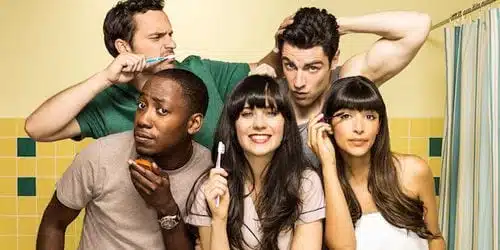
Zooey. To gaze at her is to get religion, because she’s proof that angels walk the earth. To know her is to have faith in humanity, because who could be a cynic before someone so beautiful and talented, yet so humble and sincere? In her wake, wilting flowers stand straighter, Jews and jihadists join hands, and raging beasts are soothed as if by gentle song.
This seems to be the consensus. But, as someone who’s yet to eat whatever ergot is making everyone idolize Zooey Deschanel, my feelings toward her range from indifference to mild anxiety. I don’t want to stare longingly into her half-dollar-sized eyes; I find them unsettling. Her music, though perfectly inoffensive, sounds vacant and medicated, the sort of thing that might be piped into the Transatlantic Pyramid building’s elevators once the Pod People are done taking over. Yes, she’s striking in (the underrated) The Happening and (the overrated) (500) Days of Summer. But that has less to do with her looks or performances than the fact that both roles call for her to be larger-than-life while being nebulous, not quite there.
I’ll put it another way: if you came out of (500) Days thinking Tom and Summer had a true and touching love that somehow just didn’t work out, then you completely missed the whole fucking point of that movie. Summer is a blank slate on whom the narcissistic and insecure Tom can project his totemic ideals about women and romance; beyond this, she’s more a figment than a real person. For Zooey, that’s perfect casting.
So, given that I’m the sole human being I know who snarks instead of squees when the subject of Zooey comes up, why do I like her sitcom? Because she’s not in it that much.
I mean, yes, hers is the principal role. But given the show’s Zooeycentric premise and the zeal of Deschanel’s fan base, I would have expected New Girl, currently winding down its second season on Fox, to consist entirely of her mugging cutely and cooing extended monologues, leaving her supporting cast with little to do but fan her with palm tree leaves.
But instead she shares more or less equal time with costars Jake Johnson, Max Greenfield, and Lamorne Morris. New Girl’s Marxist division of labor is explicitly part of the exercise in “Virgins,” the episode airing 30 April. It opens with a love-weary Jess (Deschanel) and her roommates helping one another prep for various dates, which soon segues into a round-robin discussion of how everyone lost their virginity. These yarns are predictably zany — we’re treated to playground sex, David Foster Wallace references, Mick Jagger, and a murder — and often laugh-out-loud funny. There’s a certain sameness to them, though, as there’s a certain sameness pervading the show as a whole.
To their credit, the execs at Fox — like a lot of other networks lately — seem to have realized it’s cheaper and more lucrative to buy decent writers than elaborate special effects, market research, and licensing fees to remake old, established franchises. On the other hand, at least where New Girl is concerned, these writers seem more gifted at composing gags than actual characters or storylines. Indeed, far from being a Zooey delivery vehicle, the show suffers from something like the opposite problem: neither Jess nor the other characters particularly stands out. Sure, on paper they’re distinct. Jess is the bubbly one, Schmidt (Greenfield) the womanizer, and so on. In execution, though, they all come across as fast-talking wisecrackers who take turns alley-ooping one-another’s jokes.
Attempts are made at setting up a trajectory, the ongoing sexual tension between Jess and Nick (Jake Johnson) being key among them, but these feel half-hearted. Johnson and Deschanel not only fail to strike up any romantic spark, they aren’t really trying that hard; indeed, the lack of effort seems to be part of the point. A recurring theme in the episode “Bachelorette Party” (last week’s episode) was the “dead dad pass,” in which Nick invoked his father’s recent death to excuse all sorts of social gaffes. The dead-dad-pass jokes were amusing, but the humor came at a price: it made Nick nearly impossible to take seriously as a character, since his attitude toward his own grief was so surreally indifferent.
New Girl would probably be a better show if it dared to eschew this curious detachment from time to time and instead venture into storylines with more emotional heft. Problem is, it would also probably be an entirely different show. Indifference and lack of follow-through are at the core of New Girl, which is another way of saying the show has none.
Consider: the abortive opening credits sequence for this season has doe-eyed Deschanel striking a knock-kneed pose as her costars hold cardboard titles and props around her. But just as the pose is struck, said costars wander off, the effort of maintaining the show’s façade evidently proving to be too much for them. Consider too the unproductive self-referentiality of the theme song’s lyrics. “Hey, girl,” Jess-slash-Zooey asks herself, “Where you goin’?”, as though she herself doesn’t know. Where other sitcoms might find some use for this postmodern blurring of performer and character — think the complicated half-fictional, half-autobiographical roles in Curb Your Enthusiasm and Seinfeld — in New Girl, it seems done for its own sake.
This ultimately gives the show a dated feel, its mood and characters better suited to detached ‘90s slackerism than despondent ‘10s malaise. Perhaps it’s unfair to ask that a sitcom be relevant, timely, or emotionally engaging. After all, TV comedies are meant to be mere diversions. Still, a show sometimes comes along that manages to elevate itself (the bawdy and brilliant Archer comes to mind). New Girl, though, is determined to avoid any such higher aspirations. Funny though it can be, New Girl, in answer to Deschanel’s question, is going nowhere.

